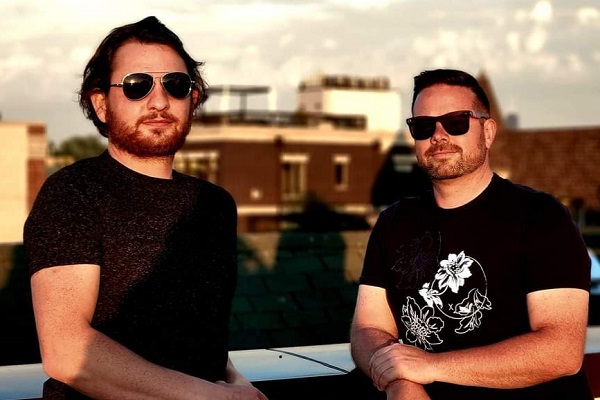Indie Rockers Vandalay Discuss the Importance of Supporting Local Music

Vandalay believe in supporting local music – Story by Anne Erickson, courtesy photo
Local Music Beat: Detroit and Chicago indie rockers Vandalay discuss the importance of supporting local music and more
Detroit and Chicago’s Vandalay have kept busy the past few years, releasing new music and touring. The indie rock duo released their latest studio album, “Return,” in 2021, which was largely created during the pandemic. Now that live music is back, Vandalay have been touring on the release all year.
Vandalay features Jake Greenwood from Detroit on vocals, drums and keys, and Ben Warner of Chicago on vocals, guitar and bass. They checked in with Audio Ink Radio to talk about the importance of supporting local music and more. Vandalay has upcoming gigs at Arts, Beats & Eats festival in Royal Oak, Michigan, on Friday (Sept. 1) and at the Magic Bag in Ferndale, opening for Jimmie’s Chicken Shack, on Saturday (Sept. 2). They’re also opening for the Verve Pipe at Grewal Hall in Lansing on Dec. 9. Find ticket information and more on supporting local music via their website.
Audio Ink Radio: The last time we interviewed you, it was back in 2021, and you had recently released the album “Return.” What’s new with the band since then?
Greenwood: Since releasing “Return” in 2021, we’ve been playing live in support of the album. With over 10,000 streams on Spotify, it’s definitely our most successful release to date. In June of this year, we released two singles new singles: “Lighthouse” and “3024.” Currently, both combine for almost 8,000 streams, so we’re excited to see the rapid growth in listeners. We have some big shows coming up this fall and winter, and we’re looking forward to playing them.
Do you feel that live music has returned to where it was before the pandemic yet?
Greenwood: I think so. The frequency of shows and attendance seems to be back to normal.
Warner: From a music fan’s perspective, yes, there are countless opportunities to find good live music on any given night. From the viewpoint of a band, we have noticed a decrease in the amount of performance opportunities for bands like us. We think it’s this type of “backlog” caused by the pandemic and venues having to shut down temporarily or permanently, which caused shows to postpone or get canceled. Hopefully, we’ll see some more venues and opportunities open up soon.
Do you think music fans are more appreciate of live shows now that they went through that drought during the pandemic?
Greenwood: There does seem to be a genuine appreciation for live music since the pandemic, not only from the fans, but from musicians, too. The pandemic revealed a reality where live music could not happen, at least in the sense of a communal experience. Prior to that, I think we took for granted that we could play or go see a live show anytime we wanted. Now, through the pandemic, I think bands and fans demonstrate an added appreciation for the special moments and bonds that live shows bring.
Warner: Yes. From the bottom up, people are going to more live shows. At the local level, I’ve noticed true music fans are going out to see lesser-known artists more and more. Maybe they heard a song on Spotify, liked that artist’s style and saw that the band was coming to a small venue down the street and went to go see them. I’m hearing of this happening more often than before. On the national stage, ticket prices have increased significantly, and these shows are still selling out. Some people need to see live music; it’s almost a requirement for certain fans. Taking that away from them just pushed that need further, and now that live music is back, they aren’t taking it for granted.
You have some cool gigs on the way, including playing Arts, Beats & Eats Friday (Sept. 1) in Royal Oak and opening for Jimmie’s Chicken Shack Saturday (Sept. 2) at The Magic Bag in Ferndale.
Greenwood: Yes, it’s going to be a big weekend for us. We don’t typically book back-to-back shows in the same area, but we didn’t want to turn down either opportunity. As a result, we have some added pressure in getting folks out to the shows, particularly the Magic Bag. With the Arts Beats & Eats show, we’re excited to showcase our live set to a broader audience that might not typically come to an alt-rock show. That, and we love playing outdoor stages, too. With the Magic Bag, we are so excited to play that stage. I think our live show is represented most genuinely indoors, in a controlled space. Both of us have seen many of our favorite acts come through that venue, and we’re looking forward to adding it to our list of venues played.
Warner: Regarding the show at The Magic Bag with Jimmie’s Chicken Shack, having the opportunity to perform on the same bill with a band that you grew up listening to might be one of the coolest perks about being in a band. It validates the hard work you’ve put in. Plus, they’ll put on a fun show. On Sept. 1, we’re looking forward to playing outside at Arts, Beats & Eats. We always have fun at the outdoor shows. Also, a majority of the people going to that festival have never heard of Vandalay, so these are great opportunities for us to find new fans.
Both of these events have national headliners. What do you think is the significance of supporting local music and acts at these shows?
Greenwood: It’s no secret that the Detroit area has some of the best local music in the country, from all genres. That alone should encourage music enthusiasts to get out and discover new music. But, what most people don’t realize is the responsibility of local acts getting their fans out to these types of shows. There is a real pressure on local acts to “fill out the room.” The bigger the show, the bigger the financial risks, and local bands are relied on to help meet those financial goals. If a show does not do well, you just might not see that local act again for a long time. Over the years, Vandalay has decided to play less often for bigger opportunities. With that said, we won’t be looking to play the Detroit area again for a while, so please come out and support.
Warner: The significance is these national headliners were at one point supporting local acts in their original communities. Good talent can come from anywhere, and it exists everywhere. We just need to do a better job of finding it. What talent is hidden in your community?
Why do you believe it’s important for the local community to keep supporting local music?
Greenwood: Local music represents the communities from which they come. Hopefully, there’s a sense of pride and ownership from both musicians and fans. It’s almost like rooting for your favorite sports home team. Their success can be influenced by your support and enthusiasm. It’s definitely a mutual effort.
Warner: Supporting local bands or businesses is increasingly important at this time. Local options allow us to connect and support each other. They allow us unique opportunities to see our community thrive. Entrepreneurs and artists alike do not create their work for themselves; they want people to experience their vision. Oftentimes, the people who are first to experience the vision are the people within your community.
What are your thoughts on the state of independent music today? Do you think it’s in a good place?
Greenwood: I think independent music has never had more resources than it does today. If you have the motivation and drive to tackle everything yourself, the tools are there for you to do it. Vandalay has always been a DIY band. Booking, recording, promoting, distributing, merchandise and selling tickets we do in house. That’s ultimately why we genuinely appreciate fans who attend our shows. We work really hard to keep something we love going, and when people show up to experience the results together with us, it makes it all worth it.
Warner: I think it’s in an exploratory, “still finding itself” kind of place. Technology advancements have made it incredibly easy to produce and release your music on a global stage. Additionally, there are several ways to find new music through various streaming platforms. So, you as the listener have all of the music available and all of the possible ways to consume it, but how do you find it? I think in the near future, we’ll see some sort of organization to the madness. But, for now, go to local shows to discover new music.
Do you feel it’s easier for independent bands and musicians to succeed today, because the gatekeepers are gone, or is it more difficult, since anyone can release music?
Greenwood: I think it’s certainly easier for any band to release and distribute their own music today. But, a result of that is the saturation of the market. I’m not saying that there is too much music. But, I think that you still have to have the work ethic and drive to reach a larger audience. We’ve been at this for over 10 years now, and we still have to work really, really hard to promote and get people out to our shows.
Warner: I think it’s actually harder to make it at the national level, because the listeners’ expectations of quality have significantly increased in the last 10 to 15 years. Now that anyone can release music, the standards have become higher. For example, pop and top 40 music is in a great place today because there’s no longer one style of “pop” music. Now, pop is a blend of multiple genres done in different ways and seemingly done well. So, even at the highest level, not only does an artist have to be highly talented more so than before, but they also have to bring originality to their sound.
- The Bands That Quietly Started the Grunge Rock Movement - July 9, 2025
- The Most Underrated Pearl Jam Album of All Time - July 4, 2025
- 3 Underrated Foo Fighters Songs That Should Have Been Hits - June 23, 2025









